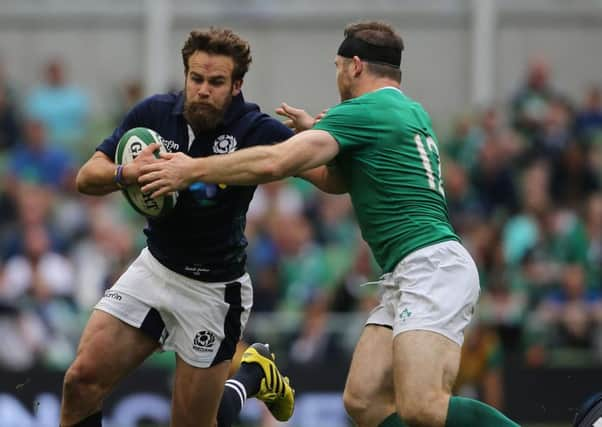Allan Massie: Scots know how to play, but not win


It’s a good point, but, as anyone who watched Andy Murray trying to close out the Masters final in Montreal can tell you, getting over the finishing line is often one of the hardest things in sport. Murray managed it; Scotland didn’t. Cotter’s team know how to play good rugby. They don’t yet know how to win. To be fair, credit should be given to the excellent Irish fly-half, Ian Madigan; he was the man who really snatched victory for the home team in Dublin on Saturday. But the difference between the two sides was that, over the last couple of years, Ireland have learned how to win close games, and Scotland haven’t.
Still this was less than a full international, if a good deal more than a trial. I reckon that seven of the Ireland side might be in Joe Schmidt’s preferred World Cup XV, perhaps no more than three or four in Vern Cotter’s. So a lot of players on both sides were competing for a place in the 31-man World Cup squad. A fair number of Scots did their chances no harm.
Advertisement
Hide AdAdvertisement
Hide AdWhat did we learn? None of the backs had a poor match, though Greig Tonks’ kicking was below the standard required of an international fly-half. Ruaridh Jackson, after missing all last season on account of injury, was full of running. If Cotter wants a player capable of covering both the full back and fly-half positions and it comes to a race between Jackson and Tonks, I reckon the former got his nose in front. Yet both may miss out. It depends on the wing selections. Sean Lamont, first capped in 2006 and a veteran of two World Cups, looked at least as good as ever, his rumbustious break leading to Peter Horne’s excellent try. Tim Visser had a good match too. You might not want him in the team against South Africa, but you’d expect him to score tries against Japan or the USA. Cotter may well choose to pick them both, along with Sean Maitland and Tommy Seymour, with Maitland also acting as deputy to Stuart Hogg.
We all hope that Alex Dunbar and Mark Bennett, our first-choice centres, will be fit. If they aren’t, then Richie Vernon and Peter Horne can do the job, just as they did for Glasgow in the second half of their last triumphant season. If they are, then Matt Scott’s chance of displacing Vernon as the fourth centre must depend on him regaining his form of two years ago before his shoulder injuries took him out of the game.
The five half-backs in the squad are now, presumably settled, barring injuries, since Chris Cusiter opted for family reasons to miss the training build-up.
So we come to the scrum, and real problems. Our set scrum has usually come off second-best for years now, and it did so again on Saturday. Some look on the now-qualified South African tighthead, WP Nel, to set things right. He may indeed do so, though one has quite often seen him in difficulties – and conceding penalties – when playing for Edinburgh. Of course scrum performance is rarely consistent, often indeed not for the duration of a match. There’s a case however for saying that you pick your two best scrummaging props – and never mind if they don’t shine as carriers. Ryan Grant’s injury is worrying, but the scrum went marginally better in the last quarter of the game when Mike Cusack and Gordon Reid had replaced Grant and Jon Welsh.
The three hookers in the squad – Ross Ford, Fraser Brown and Stuart McInally – are all converted flankers (though Ford’s conversion took place a long time ago). None is a hooker in the old sense of the word – that is, someone who actually strikes or hooks. Nowadays of course accurate throwing-in at the lineout has become the most important part of the so-called hooker’s job.
The position at lock is less worrying. Grant Gilchrist, another long-time injury absentee, played the full 80 minutes in Dublin, and played very well too. The Gray brothers are certainties – fingers crossed – and Cotter seems to see the admirably abrasive Rob Harley as a lock rather than flanker, his usual position for Glasgow. So it may be farewell to Jim Hamilton – for the time being anyway.
David Denton had an outstanding game – though he’ll surely blush when he watches the video and sees how he ignored a three-to-one overlap outside him. He wasn’t running with his body at such a low angle to the ground – a bad habit which meant that he was rarely able to offload or even place the ball for the ensuing ruck. Consequently his charges into the midst of the defence, and sometimes through it, were more productive than they have been recently. This World Cup may be his hour.
Hugh Blake did enough to show why Cotter rates him so highly; not perhaps enough to show that he is ready for international rugby; he made little impact at the breakdown, less than his fellow flanker Blair Cowan. If Cotter is toying with the idea of playing two sevens, as Australia did when they beat the All Blacks in Sydney, and didn’t when they lost the return in Auckland, one would think John Barclay a better bet than young Blake.